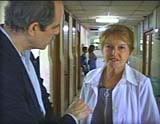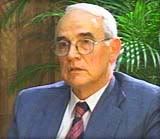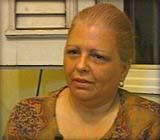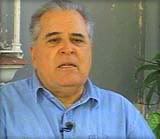Online NewsHour reports:
PAUL SOLMAN: Dr. Erminia Valenzuela is a cardiac surgeon with a message. DR. ERMINIA VALENZUELA: I don't want to end this interview without asking the people of the United States to help us to end with the block.
DR. ERMINIA VALENZUELA: I don't want to end this interview without asking the people of the United States to help us to end with the block.
PAUL SOLMAN: The blockade.
DR. ERMINIA VALENZUELA: The blockade.
PAUL SOLMAN: The embargo.
DR. ERMINIA VALENZUELA: The blockade, the embargo. So I'm asking the people of the United States to help us to end the blockade.
PAUL SOLMAN: She runs this ward at Havana's top pediatric hospital, where children with serious heart defects come for surgery they can't get in the provinces. The care tops anything in the third world, she says, but could be much broader.
DR. ERMINIA VALENZUELA: If we are able to operate on 500 patients in a year, it would be enough in order not to have a waiting list.
Cuban health care
PAUL SOLMAN: They used to do 500 operations a year back when the Soviet Union subsidized the Cuban economy, including its medical care. They don't, however, blame the Russian pullout for the waiting list, but the U.S. blockade, or "block."
DR. ERMINIA VALENZUELA: With all these difficulties of the block, we had less money, and we had to decrease the number of operations to 50 percent or 60 percent.
PAUL SOLMAN: "Stop the blockade." It's a refrain we heard at almost every stop in Cuba, including Lenin High School.
STUDENT: Cuba is open to the world, and the world is almost open to Cuba, but we have, how can I say, a door closed for us.
PAUL SOLMAN: But isn't it socialism that prevents Cuba from becoming richer, we asked.
STUDENT: We got education, hospitals, medicines, all free, and if we want to be richer, we don't have to stop to get all of that. We only have to... You only have to stop this blockade.
The U.S. position
PAUL SOLMAN: We could go on, but you get the point: Even though Cuba now gets goods from all over the world, the U.S. embargo is still the number one excuse for Cuba's economic failings. Now, Cuba has actually lived with the embargo about as long as it's lived with socialism. In fact, the two are inseparable. When Fidel Castro first descended from the hills and toppled the Batista dictatorship in 1959, the Republican Eisenhower administration never imagined Cuba would soon be sleeping with the ideological enemy.
But within a year, Castro began nationalizing U.S. businesses. President Eisenhower-- a longtime friend of Batista-- retaliated by severing diplomatic relations, while the CIA initiated plans to assassinate Castro and invade Cuba. Eisenhower also set in motion an embargo on trade, made law by President Kennedy and Congress in 1962.
There have been opponents, like Jimmy Carter and the UN, which condemned it just last year by a vote of 163 to 3. But Miami's Cuban exile community and its allies in Congress have always prevailed. In 1996, Congress passed, and President Clinton reluctantly signed, the Helms-Burton Act, which among other provisions extended the penalties on trade with Cuba to companies and nations outside the U.S.
SEN. PHIL GRAMM: Our position has always been a commitment to isolation, the isolation of Cuba, and a commitment to overthrowing Fidel Castro. Today, with this bill, we go back to that policy and we hit Fidel Castro where it hurts the most. We hit him in the pocketbook.
PAUL SOLMAN: It's been a 40-year campaign, then, of U.S. economic pressure to topple Castro and install democratic capitalism, a campaign Castro has used for dramatic effect.
FIDEL CASTRO (Translated): What the imperialists want for us is nothing but capitalism, and worse still, the capitalism of the third world, of Guatemala and Honduras. But we'll defend our socialism at any cost.
PAUL SOLMAN: And defend it he has. But if Castro isn't quitting, neither is his opposition. (Crowd chanting) The key, according to anti- Castro forces outside Cuba, is to support anti-Castro forces inside the country-- build an anti-socialist opposition, like solidarity in Poland.
REP. LINCOLN DIAZ-BALART: There is a growing internal opposition movement that is being oppressed and repressed, thrown in dungeons on a day-in and day-out basis, and yet it has demonstrated extreme courage and is growing. That has to be the focus of our policy.
PAUL SOLMAN: To find out what the internal opposition itself makes of this approach, we went to see Cuba's best-known dissident. Elizardo Sanchez spent eight years in prison for crimes against the state. And yet, this is what he said:
ELIZARDO SANCHEZ (Translated): For 15 years, I have been in a group that has opposed these sanctions. They're unilateral actions of Washington against Cuba. For a long time, I was alone among dissidents in this view, but now nearly all of us oppose the U.S. policy.
PAUL SOLMAN: Arrested at gunpoint in the middle of the night for opposing Castro, Sanchez also opposes the policy on which his U.S. supporters pin their hopes.
ELIZARDO SANCHEZ (Translated): I believe the embargo is the best ally this totalitarian government has, because it justifies its failures. When there's no medicine or transport, or food, everyone says, "it's Washington's fault."
Blaming the embargo
PAUL SOLMAN: Indeed, the embargo is widely blamed for many, if not all of the country's economic woes. We heard that argument, among other places, at Cuba's version of the Federal Reserve, its Central Bank, where revolutionary hero Che Guevara once presided as the country's first Alan Greenspan. Francisco Soberon is now in charge, and maintains the embargo has cost Cuba decades of development.
FRANCISCO SOBERON: It's a terrible cost, you see. It has to be measured in hundreds of billions, already.
PAUL SOLMAN: Hundreds of billions, you mean cumulatively?
FRANCISCO SOBERON: Accumulated during these 40 years.
PAUL SOLMAN: Soberon reorganized the bank to help implement market reforms after the Soviet Union-- and its huge subsides-- vanished in the early '90s. But he's still a devout socialist who blames the embargo for crippling Cuba's economy.
FRANCISCO SOBERON: We cannot go to an American bank to ask for a loan. But not only that, foreign banks, a lot of them have very close links with the American markets, and a lot of them feel that if they do business with Cuba, it could hamper their relations with the United States, and then they don't want to do business with us.
PAUL SOLMAN: Finance from abroad is key, says Soberon, because Cuba's own major investments have been in health care and in education; investments, that is, in "human capital," in Cuba's people, an asset of professional talent just waiting for the financial capital to make it world-class productive.
FRANCISCO SOBERON: 700,000 professionals, we have.
PAUL SOLMAN: 700,000 professionals.
FRANCISCO SOBERON: 700,000. And when I say "professionals," I mean people who have a university degree, you see?
PAUL SOLMAN: At a baseball game one night in Havana, we got yet another example of the embargo's cost.
MAN (Translated): You know, we've got this fight with the U.S. to buy oil, we have to get it all the way from Russia. Imagine if we could just get it from you, 90 miles away, how much easier and cheaper it would be.
PAUL SOLMAN: So then, the embargo would seem to be working, just as its supporters claim. But when we trekked to a far-off Havana neighborhood to interview another dissident, we again heard the message that the embargo is letting socialism off the hook and that trade with the U.S., according to Marta Beatriz Roque, would actually speed economic and political reform.
MARTA BEATRIZ ROQUE: I'm against the embargo. I would like that the embargo will be lifted.
PAUL SOLMAN: Because?
MARTA BEATRIZ ROQUE (Translated): Because I believe Cuban society needs contact with North American society. We need to be in touch with capitalism.
Supporting the economy
PAUL SOLMAN: To the extent that Cuba is changing, many think, it's because of contact with the capitalist U.S., for better, or sometimes worse. And certainly, says Roque, economic contact with U.S. capitalism keeps the dissident community alive.
MARTA BEATRIZ ROQUE (Translated): I have family outside. I have support. Many friends in the U.S., especially in Miami, help us.
PAUL SOLMAN: As it happens, it's not just dissidents who get help from friends and family in the U.S. In Miami's Little Havana neighborhood, business at Western Union is brisker than ever these days.
MAN (Translated): With Western Union, you can send up to $100 a month to any one person.
PAUL SOLMAN: This Cuban exile, who preferred not to give his name, came to the states 12 years ago and has been sending dollars back home ever since.
MAN (Translated): I sent money to my parents so they could come and visit, and they did. Now I have to wait three more months before I can send any more.
PAUL SOLMAN: Again, back in Havana, dissident Elizardo Sanchez:
ELIZARDO SANCHEZ (Translated): I would say that 20 percent to 30 percent of what Cubans manage to get to survive comes from remittances -- my family included.
PAUL SOLMAN: What percent of your income-- family income-- comes from remittances?
MAN (Translated): Eighty percent. It's been that way for 20 years.
PAUL SOLMAN: Remittances-- what the Cubans call ramesas-- may actually be the single biggest source of dollars in what's becoming a dollarized country. You can use them to buy your own car, or to take a taxi instead of waiting for the so-called "camels," the trucks modified to haul people that most Cubans are forced to rely on.
If you pay in dollars at Coppelia's ice cream parlor, you can skip the long peso line and sit in comfort with the tourists. The burgeoning well-stocked supermarkets are dollars-only, which relegates those without dollars to the state's own meager food stores, where the pickings are generally slim and where they wouldn't let us take pictures. What's more, the dissidents say, the government itself relies indirectly on remittances, via heavy taxes on the dollar economy, to help finance, among other things, the costly Cuban safety net in health care and education.
PAUL SOLMAN: Do you think remittances are keeping the government in business?
ELIZARDO SANCHEZ (Translated): Definitely. Remittances coming from the U.S. have substituted in part for the huge subsidy we got from the Soviet Union. Today the remittances represent more than sugar exports and tourism. They're the principle source of income for the government. The total now comes to between $800 million and a billion dollars a year.
PAUL SOLMAN: Moreover, exile economic support doesn't stop with wiring dollars from the U.S. While some who fled have vowed never to return, many do come back, as tourists, and tourism now makes up fully 5 percent of the Cuban economy. And furthermore, when the exiles return, they bring not just first world cash, but bundles of first world stuff for their families-- TV's, toasters, VCR's.
When you add it all up-- the purchases, the care packages, the tourism, the remittances-- it seems the exile community is tossing a lot of money over the wall they themselves helped build-- between 5 percent and 10 percent, by some estimates, of the entire Cuban economy. So Castro's foes outside Cuba support the embargo politically while perhaps undermining it economically. And Castro's supporters inside Cuba condemn the embargo, though it arguably serves as their best excuse.
ELIZARDO SANCHEZ (Translated): For decades, the government has liked to present an image of itself as a little David against a giant Goliath. The day they lift the embargo and normalize relations as you've done with Hanoi, for example, or China, that will be the beginning of the end for this government.
PAUL SOLMAN: Now, it's possible that dissidents like Sanchez may be wrong about the embargo's effects, that the government's efforts to end the blockade are genuine. At the same time, the message we kept hearing-- from street level to the highest ranks of government-- was that the policy intended to bring Cuba to its knees may in fact have done quite the opposite.
FRANCISCO SOBERON: The blockade, or the economic war of the United States, has been terrible for us, no? But the good part of it is that it has made us stronger, because we have... When you have to fight, when you have to face more big challenges, then you become stronger.
PAUL SOLMAN: A sobering thought on a U.S. policy that Cuba, after four decades, appears not only to have survived, but to have turned to at least rhetorical advantage.
JIM LEHRER: On Tuesday, President Bush announced he would not enforce a section of the 1996 Helms-Burton Act. It allows Americans to sue foreigners who invest in properties confiscated by the Cuban government.
Wednesday, July 18, 2001
Blaming The Blockade
Posted by Maeven at 11:57 PM
Labels: capitalism, Cuba, health, socialism, U.S. foreign policy